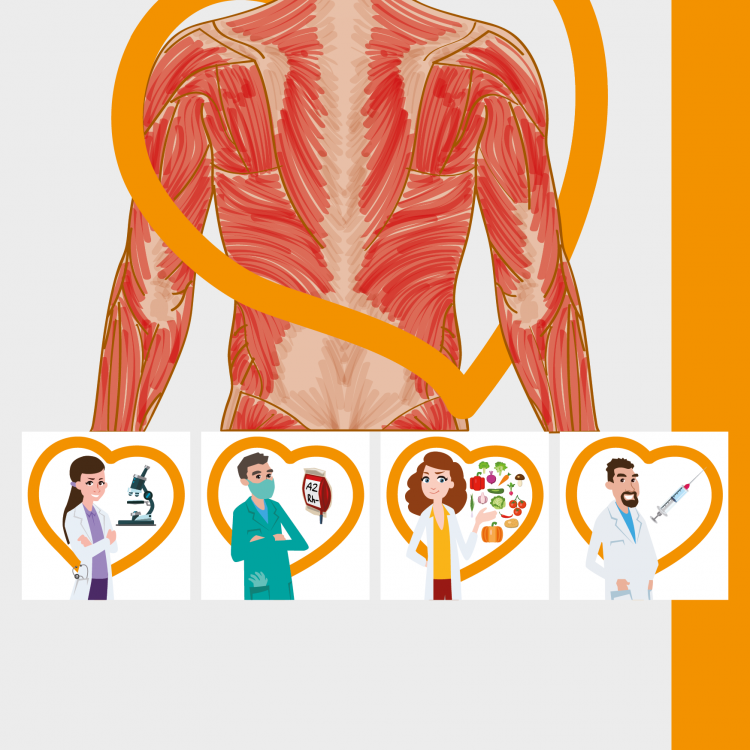Sarcomas and Rare Tumours Programme
The Sarcomas and Rare Tumours Programme is dedicated to the diagnosis, treatment and follow-up of a group of rare and heterogeneous tumours. For this reason, a multidisciplinary approach is a key element of the Programme, standardizing and simplifying the diagnostic-therapeutic pathway and placing the patient and their specific condition at its centre. In this context, clinical and translational research become vital instruments in broadening diagnostic and therapeutic horizons, putting an ever greater distance between these tumours and the family of “orphan diseases”.
- Sarcomas and Rare Tumours Programme
The rare disease necessitates the capacity to work in a network at local, national and international levels. For this reason, our Centre is a reference point, both regionally and nationally, and is part of collaborative networks such as the ISG (Italian Sarcoma Group), the national Rare Tumours Network (RTR), the EORTC (European Organisation for Research and Treatment of Cancer), ERN-EURACAN (European Reference Network - European network for Rare adult solid Cancer). It is within this network that the Istituto di Candiolo participates and coordinates clinical and preclinical research studies focused on constant improvement in care strategies.
- Multidisciplinarity
Thanks to a team of experts associated with the various specialities involved - Medical Oncology, Oncological Surgery, Orthopedics, Otorhinolaryngology, Dermasurgery, Gynecological Oncology, Radiation Therapy, Anatomical Pathology, Radiodiagnostics, Surgical Radiology and Nuclear Medicine –the patient enters an integrated and highly-personalized system. This integration is present on every level and each patient is offered the opportunity to make use of further support services (service di psycho-oncology; social worker; connections with the local area for continuity of care and assistance).
On the patient's very first appointment at the Reception and Services Centre (CAS), his case is referred to the dedicated nursing service and to the Interdisciplinary Care Group (GIC) for collegial discussion. Depending on the basis of type of therapy indicated, the specific point in the evolution of the patient's disease and the degree of intensity of the treatment required, the patient will be followed at the Standard Hospitalization Service of Medical Oncology, the Oncological Day Hospital, the Out-patient department of Oncology for the first examinations, restaging and follow-up.
- Le patologie
The pathologies covered by the Sarcomas and Rare Tumours Programme are:
- Sarcomas of the soft tissues liposarcoma, leiomyosarcoma, undifferentiated pleomorphic sarcoma, synovial sarcoma, angiosarcoma, solitary fibrous tumour, malignant peripheral nerve sheath tumours, rhabdomyosarcoma, alveolar soft part sarcoma, fibrosarcoma, desmoplastic round cell tumour, hemangioendothelioma, PEComa and other histotypes
- Gastrointestinal stromal tumours (GIST)
- Osteosarcoma
- Ewing's Sarcoma
- Chondrosarcoma and other bone sarcomas
- (GCT etc.)
- Kaposi's Sarcoma
- Desmoid tumour/aggressive fibromatosis
- Chordomas
- Giant cell tumor of the tendon sheath (also known as pigmented villonodular tenosynovitis)
- Merkel cell carcinoma
- The anatomical-pathological diagnosis: A crucial challenge for therapy
- The very nature of a rare disease means that the anatomical-pathological diagnosis of sarcomas requires experience and appropriate instrumentation. Thanks to integrated approaches of immunohistochemistry, cytofluorimetry, cytogenetics and molecular biology, this Institute's Anatomical Pathology department makes it possible to pursue precision medicine even for such complex pathologies.
- Treatments: standard Therapies and innovation
- After discussion within the Multidisciplinary Group, the patient is directed to a specific therapeutic pathway (surgery, chemotherapy/ targeted molecular therapy/ immunotherapy, radiotherapy, integrated therapies). Where possible, the patient is invited to participate in clinical studies for the purpose of improving and constantly benchmarking the highest standards of care available for the disease in question. The Sarcomas and Rare Tumours Programme, therefore, provides the opportunity to participate in many study protocols exploring the actions of chemotherapy drugs, targeted molecular therapies, and immunotherapy protocols. The list of clinical studies in progress is available at the following link
- Research: A translational approach to diagnosis and therapy
- The Programme's multidisciplinary approach combines with the translational one, which is to say, the close collaboration between clinical and preclinical research which makes it possible to lay the bases for the discovery of new drugs and new therapeutic strategies. Indeed, at the very outset of the patient's pathway, they are offered the possibility to participate in translational research studies, and the objectives of such research are explained to them before they give their informed consent. The translational research group, directed by Dr. Grignani and coordinated by Dr. Ymera Pignochino, focuses its studies on new strategies of integrated care based on the specific molecular alterations detected in each specific cancer. This requires an understanding of the molecular mechanisms exploited by the tumour for its own proliferation, of the origin of the metastasis in other parts of the organism, of the dynamics of resistance to chemotherapy and of the interactions between tumour and microenvironment.
- Staff
- Oncological Team: Giovanni Grignani (Dr), Sandra Aliberti (Dr.ssa), Lorenzo D’Ambrosio (Dr)Surgical Team: Oncological Surgery

